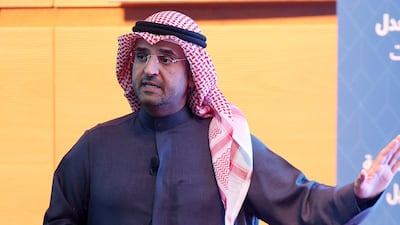A nuclear weapon-free zone must be established to ensure stability and security across the Middle East, a senior regional official has said.
“Nuclear weapons pose a serious threat to our planet,” Dr Nayef Al Hajraf, Secretary General of the Gulf Co-operation Council, told the annual Manama Dialogue on Sunday.
"This is the gravest danger ever encountered. We have to prohibit the possession, proliferation and development of such weapons."
The event was hosted by the International Institute of Strategic Studies.
A UN treaty to ban nuclear weapons is set to come into force on January 22, just over 75 years after they were used for the first time at the end of the Second World War.
The Treaty on the Prohibition of Nuclear Weapons requires that all ratifying countries “never under any circumstances develop, test, produce, manufacture, otherwise acquire, possess or stockpile nuclear weapons or other nuclear explosive devices", Dr Al Hajraf said.
It also bans any transfer or use of nuclear weapons, and the threat to use them, and requires parties to promote the treaty to other countries.
The international community must ensure a nuclear-free world while at the same “recognising the right of all countries to the use of nuclear energy for peaceful purposes", Dr Al Hajraf said.
The GCC official said Iran’s nuclear programme continued to pose a threat to regional and international stability.
He called for a new deal that would prevent Tehran from possessing weapons and missiles.
In 2015, Iran signed a nuclear deal with world powers, called the Joint Comprehensive Plan of Action.
But the fate of the pact has been in doubt since President Donald Trump withdrew the US from it in 2018 and reimposed sanctions on Iran.
Any amendments to the deal with Iran have to preserve non-proliferation and continue efforts aimed at making the Middle East a zone free of mass destruction and nuclear weapons, Dr Al Hajraf said.
"Iran is still violating UN Security Council resolutions, particularly the JCPOA, and still destabilising the region,” he said.
"The GCC should be part of any negotiation of a revised JCPOA.
"From now on, we legitimately demand to be part of any discussions surrounding the regional security architecture."
Britain, France and Germany have declared Iran to be in breach of the 2015 pact and have launched a dispute mechanism that could send the matter back to the Security Council and lead to the reimposition of UN sanctions.
The nuclear pact has been at the heart of escalations between Washington and Tehran, which have led to retaliatory military confrontations in Iraq since the start of this year.


